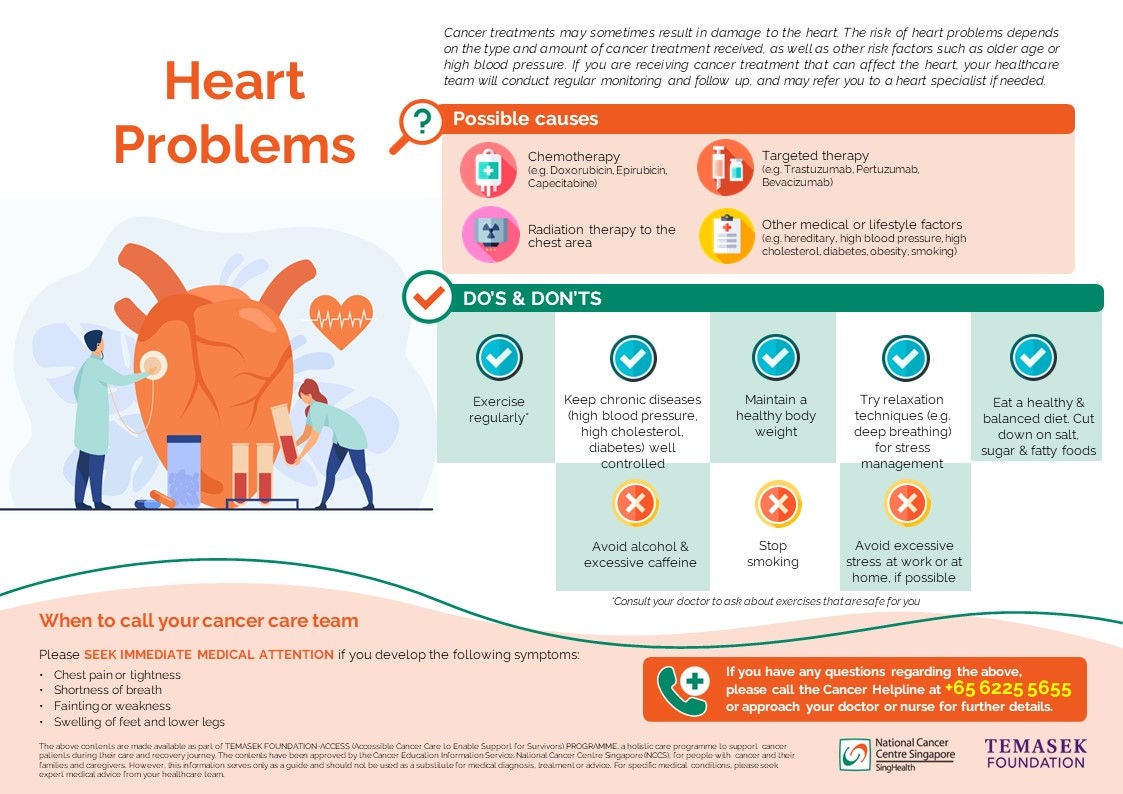National Cancer Centre Singapore will NEVER ask you to transfer money over a call. If in doubt, call the 24/7 ScamShield helpline at 1799, or visit the ScamShield website at www.scamshield.gov.sg.
Heart Problems and Cancer
- Allergies
- Appetite Loss
- Bone Problems
- Breathing Problems
- Constipation
- Diarrhoea
- Difficulty Swallowing (Dysphagia)
- Dry Mouth (Xerostomia)
- Difficulty Sleeping (Insomnia)
- Feeling Tired (Fatigue)
- Fevers and Infections
- Hair Loss
- Heart Problems
- Menopausal Symptoms
- Indigestion
- Joint Pains
- Limb Swelling (Lymphedema)
- Muscle Aches
- Nail Changes
- Nausea and Vomiting
- Pain
- Tingling or Numbness in Hands or Feet (Peripheral Neuropathy)
- Skin Changes
- Sore Mouth (Oral Mucositis)
- Taste Changes

Cancer treatments may sometimes result in damage to the heart. This is also known as “cardiac toxicity” or “cardiotoxicity”. Depending on the type of cancer treatment and damage, parts of the heart that can be affected include the normal cells around the heart, the heart muscles, heart lining and also vessels supplying blood to the heart. Although uncommon, these heart problems may cause discomfort that can lead to a negative impact on your quality of life, affect your ability to continue with the current cancer treatment, and in severe cases even be life-threatening.
Causes of heart problems in people with cancer
- Chemotherapy (e.g. Doxorubicin, Epirubicin, Capecitabine)
- Targeted therapy (e.g. Trastuzumab, Pertuzumab, Bevacizumab, Lapatinib, Sunitinib, Sorafenib, Ribociclib)
- Radiation therapy to the chest area (e.g. for breast cancer, lung cancer, lymphoma)
- Other conditions that are not cancer-related (e.g. hereditary, high blood pressure, high cholesterol, diabetes, stress, obesity, smoking)
What you need to look out for
Symptoms may develop during or soon after your cancer treatment, but it may also be unnoticeable until months or even years after treatment completion. However, you should seek medical attention once you experience any of the following symptoms:
- Chest pain or tightness
- Pain in the neck, jaw, throat, upper abdomen, arms or back
- Fast or irregular heartbeat
- Difficulty breathing
- Coughing
- Swelling of feet and lower legs
- Feeling weak or dizzy
- Feeling tired
How it can be treated
The risk of heart problems depends on the type and amount of cancer treatment you have. Before the start of your cancer treatment, your doctor will explain to you about possible side effects of the treatment. If there is a risk that your heart will be affected, investigations (usually a heart scan) may be done to assess your heart function before, during and after your treatment.
If heart problems are detected, your doctor may decide to reduce the amount of treatment, or change to another drug that may be less toxic to the heart. Your healthcare team may also refer you to a heart specialist for further tests and treatments that may improve your heart condition.
What you can do
The following are some tips you can do to keep your heart healthy during treatment:
|
|
When to call your cancer care team
Early treatment for cardiac toxicity may prevent serious heart damage. Therefore, please seek medical attention as soon as possible if you experience any of the following that may indicate heart problems:
- Chest pain or tightness
- Trouble breathing
- Fainting or weakness
- Swelling of feet and lower legs
If you have any questions regarding the above information, please call Cancer Helpline at +65 6225 5655 or approach your doctor or nurse for further details.
Click here to download the PDF version of this article.
如果您要下载本文的中文版本,请点击此处。
Klik di sini untuk memuat turun versi PDF artikel ini.
The above contents are made available as part of TEMASEK FOUNDATION-ACCESS (Accessible Cancer Care to Enable Support for Survivors) PROGRAMME, a holistic care programme to support cancer patients during their care and recovery journey.
The contents have been approved by the Cancer Education Information Service, National Cancer Centre Singapore (NCCS), for people with cancer and their families and caregivers. However, this information serves only as a guide and should not be used as a substitute for medical diagnosis, treatment or advice. For specific medical conditions, please seek expert medical advice from your healthcare team.
Brought to you by:
![]()
![]()
Keep Healthy With
© 2025 SingHealth Group. All Rights Reserved.

















